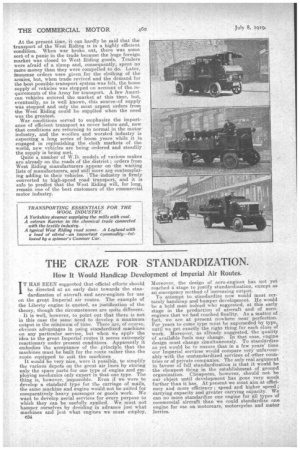THE CRAZE FOR STANDARDIZATION.
Page 12

If you've noticed an error in this article please click here to report it so we can fix it.
How It Would Handicap Development of Imperial Air Routes.
IT HAS BEEN suggested that official efforts should be directed at an early -date towards the standardization of aircraft and aero-engines for use . on the great Imperial air routes. The example of the Liberty engine is emoted, as justification of the theory, though the circumstances are quite different.
It is well, however, to point out that there is not in this case the same need to develop a maximum output in the minimum of time. There are, of course, obvious advantages in using standardized machines on any particular ,service, 'but when we apply the idea to the great Imperial routes it seems extremely reactionary under present conditions. Apparently it embodies the acceptance of the principle that the machines must be built for the route rather than the route equipped to suit the machines,
It would be very nice, were it possible, to simplify thc various depots on the great air lines by storing only the spare parts -for one type of engine and employing mechanics only expert in that one type. The thing is, however, impossible. Even if we were to develop a standard type for the carriage of mails, the same machine and engine would, not be suited for comparatively heavy passenger or goods work. We want to develop aerial services for every purpose to which they can be usefully applied. We must not hamper ourselves by deciding in advance just what machines and just *hat engines we must employ.
c34 Moreover, the design of aero-engines has not yet reached a stage to justify standardization, except as an emergency method of increasing output. To attempt to standardize now would most certainly handicap and hamper development. He would be a bold man indeed who suggested, at this early stage in the production of aircraft and of aeroengines that we had reached finality. As a matter of fact, we are at present nowhere near perfection. For years to come type must be superseded by type, until we get exactly the right thing for each class of work. Moreover, as already suggested, the quality of available fuels may change. In that case, engine design must change simultaneously. To standardize as yet would be to ensure that in a few years' time our Imperial services would compare very unfavourably with the unstandardized services of other countries or of private companies. The only real argument in favour of full standardization is that it would be the cheapest thing in the establishment of ground organization. Cheapness, however, should not be our object until development has gone very much further than it has. At present we must aim at efficiency and more efficiency ; speed and higher speed ; carrying capacity and greater carrying capacity. We can no more standardize one engine for all types of commercial aircraft than we could standardize one engine for use on motorcars, motorcycles and motor lorries.






















